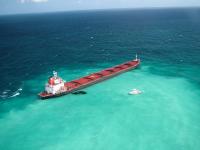Conservationists have criticised the Queensland State Government and Federal Government for the expansion of LNG and coal for export without acknowledging the environmental harm that will be caused both on land and sea by these industries. Chinese bulk coal carrier the Shen Neng 1 grounded on a reef, is leaking oil and in danger of breakup in a restricted zone about 70km east of Great Keppel Island. It grounded just after 5pm Saturday April 3, 15km from the nearest shipping channel in the Great Barrier Reef Marine Park, a World Heritage listed area.
The ship, carrying 65,000 tonnes of coal. is leaking fuel oil that has produced a slick 3km long by 100m wide. The ship is understood to have approximately 975 tonnes of heavy fuel oil onboard. There is some risk the ship may break up, with the ship at risk of more damage on the reef with the current 2-3m swell.
Ian Herbert, spokeperson for the Capricorn Conservation Council was horrified that a Chinese coal carrier had run aground near Great Keppel Island. "We can be certain that this is a sign of things to come" said CCC spokesman Ian Herbert. "A year ago - Moreton Island, yesterday - Great Keppel Island, next year - who knows where? Who knows what damage will be done to our local coral reefs and marine animals from the oil spill from the ship? We are outraged that no marine pilot is required on ships between Gladstone and Cairns."
"We are now faced with a ridiculous proposal to build a brand new coal port on Balaclava Island at the mouth of the Fitzroy River. Ships from this port will have to navigate the treacherously shallow waters of Keppel Bay at the mouth of the Fitzroy River. What hope is there for the future survival of local coral reefs fringing the Keppel Bay Islands?" said Mr Herbert. He called for the industry, not the taxpayer, to foot the bill for the full cost of the clean up.
Queensland Premier Anna Bligh told the Brisbane Times "This ship is in a very damaged condition and the worry now is that the salvage operation may disturb the ship in a way that sees more oil discharged into the water," Ms Bligh said. "It will require a serious and specialist salvage operation,."
Maritime Safety Queensland activated a national oil spill response plan on April 4 after the bulk carrier ran aground. Dispersants have been deployed twice on oil leaking from the carrier.
Maritime Safety Queensland General Manager, Patrick Quirk, said the initial damage report was that the main engine room was breached, the main engine damaged and the rudder seriously damaged. "One of the most worrying aspects is that the ship is still moving on the reef to the action of the seas, which is doing further damage," he said in an update 5th April.
A specialist salvage team, including two tugs to stabilize the stricken vessel, is preparing to board the bulk coal carrier to plan the retrieval operation. At this stage the Captain and all crew have remained aboard.
Australian Greens Leader Bob Brown has criticised both Federal and Queensland state governments for failure to mandate use of marine pilots for navigating the channels through the reefs thus threatening the Great Barrier Reef. "The failure to insist on pilots has been reckless. This is a potential disaster in one of the world's greatest natural wonders. But both the Rudd and Bligh governments are planning massive expansion of coal exports throughout the Great Barrier Reef region with no plans for mandatory piloting," Senator Brown added.
Greens spokeswoman Larissa Waters said the cost of engaging a marine pilot for the length of the Reef would be $8,000- $10,000 according the Australian Maritime Safety Authority. "Government is bending over backwards to increase exports of fossil fuels, rather than investing in job rich clean renewable energy which safeguards our reef," Ms Waters told the Brisbane Times, "The state government is being blinded by royalties and this short-sightedness will go down in history as killing the Reef."
Criticism has also come from Queensland Seafood Industry Association. Spokesperson Michael Gardiner told the ABC that there is more monitoring of fishing trawlers than large coal ships. "All trawl vessels in Queensland are required to have a vessel monitoring device in place seven days a week, 24 hours a day," he said. "Here we've got these massive ships fully laden with coal and fuel oil traversing part of the marine park, and there's certain parts there where there's no vessel tracking at all." he said.
Sources
- Maritime Safety Queensland - Great Barrier Reef grounding updates
- Capricorn Conservation Council - Oil Spill off Keppel Coast - A sign of things to come 4 Apr 2010
- The Greens media release Apr 4, 2010 Canberra Reckless with coal shipping and Great Barrier Reef
- Brisbane Times - Apr 4, 2010 - Grounded ship: 3km oil spill on Great Barrier Reef
- http://www.google.com.au/search?sourceid=navclient&aq=hts&oq=&ie=UTF-8&rlz=1T4GGIG_enAU222AU223&q=Shen+Neng+1

